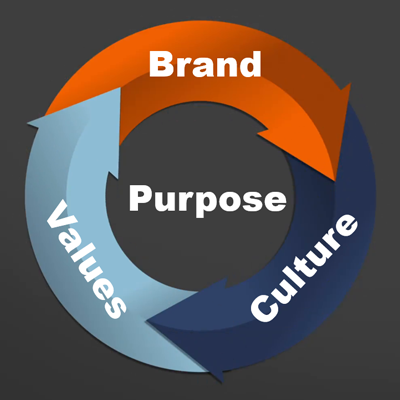When Businesses Shout
 (Phil Riggins, CEO & Founder, Brand Reputation Collective; Inge Wallace, Managing Director, European Association of Communication Directors; Paul Reza Afshar, Head of Purposeful Business, FleishmanHillard Fishburn)
(Phil Riggins, CEO & Founder, Brand Reputation Collective; Inge Wallace, Managing Director, European Association of Communication Directors; Paul Reza Afshar, Head of Purposeful Business, FleishmanHillard Fishburn)
At a roundtable we co-hosted with the European Association of Communications Directors, we asked the UK’s leading communications professionals some big questions on purpose. Here’s what they had to say…
A new era of corporate democracy?
The strongest point of consensus for our participants was that purpose can’t be a top-down management edict. And it can’t be conjured in a meeting room by expensive suits and a praetorian guard of executives.
People can’t be told what their values are and purpose is, which makes listening to your employees and advocating for them all the more important.
Many of the organisations represented had undergone broad consultation and conversation with staff to create, strengthen and build values. And this was a vital step to getting employee buy-in.
Key question: Can you imagine an engineer on the doorstep saying your purpose or values to a customer? If not, you may want to think about how you’re articulating them.
Who owns purpose?
Everyone should be behind purpose – the CEO, employees, and stakeholders.
Like many big commitments it has to have the full force of the C-suite behind it, but it can’t just be the executive talking about it. Without leadership driving purpose, it is impossible to maintain. And without it being embedded throughout the organisation, it may be impossible to sustain.
Materiality vs. Morality
Sometimes you’re going to be asked to speak out on an issue, whether it’s material to your business or not.
Communicators should be thinking about planning responses to, and narratives around, issues about which they may be expected to have an opinion.
When it comes to taking a stand on an issue, it has to be rooted in purpose. The example of Lush’s ‘Spycops’ campaign was referenced where materiality to the business and morality came into conflict. Ask yourself whether the action, and its impact, helps or hinders delivering your purpose and whether it stays true to the culture of the organisation.
Perfection can be the enemy of timeliness
No organisation is perfect. And according to our participants this shouldn’t necessarily stop you from speaking out. As long as you’re honest about the challenges you face as a business and clear about what you are doing about it, you can do both in tandem.
Key question: Do we need a new purpose communications function which helps companies navigate the complex issues about which they’re now expected to have an opinion?
What’s the purpose of purpose?
Purpose is the ‘why’ to your ‘what’. It’s the impact you have on society and the environment, not just your bottom line. It’s where ‘what’s good for business’ and ‘what’s good for us’ align. It’s more than just an advertising strapline or a programme, it’s a long-term strategy for business growth.
Does brand eat purpose for breakfast?

In short, no. Many argued that there’s increasingly little difference between purpose and brand, and that purpose was now a proxy of what brand building used to be.
In theory, purpose provides operational and strategic ‘guardrails’ that guide an organisation’s business decisions. Simply put, if a decision doesn’t meet a company’s purpose, it doesn’t get done. In theory.
Indra Nooyi’s decision to divest KFC because it didn’t meet PepsiCo’s purpose is the most memorable and practical example. But not every business has the option to do this in the near term.
What about values and culture?
Purpose is intrinsically linked to values and culture. If values guide the way employees behave, and the way they behave help builds culture, then purpose is the glue that holds it all together.
Key question: With the alphabet soup of purpose, mission, vision, values, brand and culture, do we need to simplify the equation to just purpose and our core beliefs?
For more information on what has been discussed please contact:
Paul-Reza Afshar, Partner, Purposeful Business, FleishmanHillard Fishburn
Inge Wallage, CEO, European Association of Communications Directors
Find Out More
-
Platinum CMS Award
March 13, 2024
-
Changing Communications Tack at Mobile World Congress
February 21, 2024


